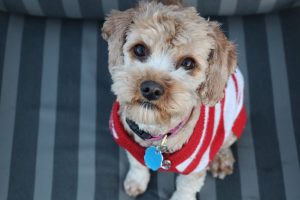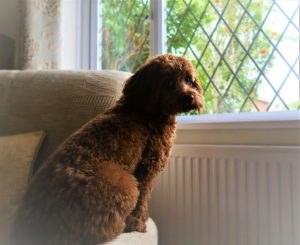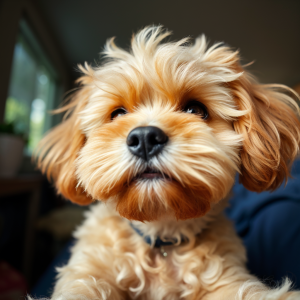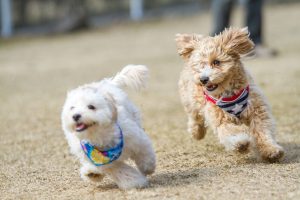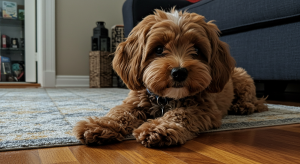
Are Cavoodles Aggressive?
Posted on March 7, 2024
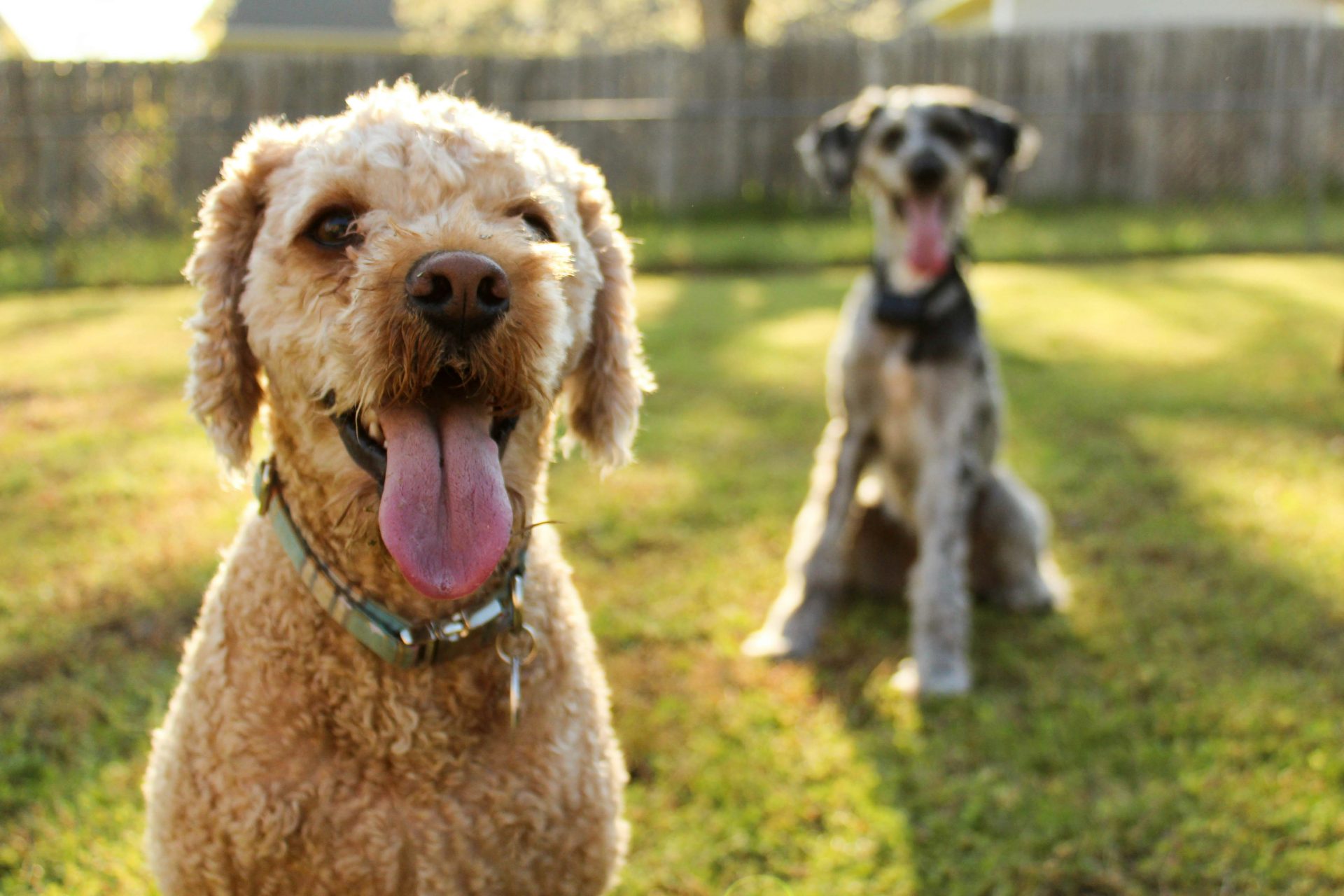
Are Cavoodles Aggressive?

The Cavoodle, a captivating fusion of the Cavalier King Charles Spaniel and the Poodle, enchants dog lovers with its endearing personality and irresistible looks. Born as a designer breed, its purpose revolved around melding the Cavalier’s tender, affectionate spirit with the Poodle’s sharp intellect and low-shedding coat.
This mix produces small to medium-sized dogs, wrapped in soft, curly, or wavy fur that emerges in a kaleidoscope of colours. Cavoodles claim the finest qualities of their parent breeds—gentleness, sociability, and intelligence—making them cherished companions for families, individuals, and seniors.
Decoding Canine Aggression
Before diving into the specific tendencies of Cavoodles, it’s essential to grasp the meaning of aggression in dogs. Aggression unfurls in various forms—fear-driven responses, territorial displays, and food-guarding behaviours among them.
This multifaceted behaviour arises from an interplay of genetics, environment, and upbringing. Pinpointing its root cause lays the groundwork for effective management, safeguarding both the dog and its human counterparts.
Cavoodle Temperament: A Perfect Balance
Cavoodles radiate affection and sociability, thriving on companionship and forming deep attachments with their families. Their dual heritage gifts them with remarkable intelligence, making them eager learners and dependable partners.
From the Cavalier lineage, they inherit a serene, loving demeanour, while the Poodle bloodline imparts alertness and curiosity. Together, these traits shape a balanced, adaptable dog, eager to slot into diverse lifestyles with ease.
What Shapes Cavoodle Behavior?
The behaviour of a Cavoodle emerges from a tapestry of influences—genetics, upbringing, training, socialisation, and the environment. Early exposure to diverse experiences and consistent, positive training mould them into well-mannered companions.
With their sharp minds and desire to please, Cavoodles flourish under reward-based methods. However, their sensitivity can clash with harsh approaches, potentially sparking fear-rooted issues like aggression.
Environmental conditions, daily routines, and mental and physical stimulation also leave their mark. Cavoodles, as inherently social animals, may experience stress or anxiety when isolated for long stretches, sometimes channelling this unease into destructive or aggressive actions.
Conclusion
Although hybrid status limits breed-specific studies on Cavoodle aggression, experts suggest they rank among the least likely to display such behaviours. Their warm and congenial nature, inherited from their parent breeds, often shines through.
Still, individual temperaments can deviate, even within the same breed. For the attentive owner, a Cavoodle typically blossoms into a gentle, loving companion with little inclination toward aggression.
Featured Posts
Cavoodle Toys
-
 Tough Octopus Plush Dog Toy
A$48.99
Tough Octopus Plush Dog Toy Durable Construction, Playful Design The Octopus is more than a regular plush toy; it's stitched to withstand doggy bites, tugs, and thrashing. Inside the head contains a squeaker, while the tentacles are lined with a crackly material that gives dogs something to munch on. Plus, there's no stuffing inside—which means no fluff flying out all over your floor. Why Dog Owners Love This Octopus: • No Stuffing = No Mess—Nothing for your dog to pull apart, nothing for your dog to swallow. That means safer play and less cleanup in your living room. • Squeaker & Crackly Tentacles—A squeaker inside the head and crinkle sewn into the tentacles provide the noise and texture dogs crave and return to. • Durable Construction—Composed of plush polyester with reinforced stitching. It's ready for tug-of-war and chomping while you urge them on. • Good for Teeth & Gums—The fabric's coarse enough to bring to teeth and gums, scraping off residue as they chew. • Non-Toxic & Machine Wash Safe—Made of non-toxic materials with food-safe dyeing. When it gets dirty, toss it in the washing machine. Includes: • 1 × Octopus Plush Dog Toy • Head squeaker and crackly tentacles Features: • No stuffing—no mess • Squeaky head & crackly tentacles—never gets boring • Reinforced seams—stronger than average plush toys • Coarse fabric—cleans dog’s teeth and gums • Non-toxic plush—safe for everyday use A Toy That Will Last Longer! With noise, crunch, and tugging capabilities combined into one toy, this octopus can be chewed, shaken, and carried around without falling apart like a typical plush would. Add one to your cart to give your dog a toy they’ll keep bringing back for more!
Tough Octopus Plush Dog Toy
A$48.99
Tough Octopus Plush Dog Toy Durable Construction, Playful Design The Octopus is more than a regular plush toy; it's stitched to withstand doggy bites, tugs, and thrashing. Inside the head contains a squeaker, while the tentacles are lined with a crackly material that gives dogs something to munch on. Plus, there's no stuffing inside—which means no fluff flying out all over your floor. Why Dog Owners Love This Octopus: • No Stuffing = No Mess—Nothing for your dog to pull apart, nothing for your dog to swallow. That means safer play and less cleanup in your living room. • Squeaker & Crackly Tentacles—A squeaker inside the head and crinkle sewn into the tentacles provide the noise and texture dogs crave and return to. • Durable Construction—Composed of plush polyester with reinforced stitching. It's ready for tug-of-war and chomping while you urge them on. • Good for Teeth & Gums—The fabric's coarse enough to bring to teeth and gums, scraping off residue as they chew. • Non-Toxic & Machine Wash Safe—Made of non-toxic materials with food-safe dyeing. When it gets dirty, toss it in the washing machine. Includes: • 1 × Octopus Plush Dog Toy • Head squeaker and crackly tentacles Features: • No stuffing—no mess • Squeaky head & crackly tentacles—never gets boring • Reinforced seams—stronger than average plush toys • Coarse fabric—cleans dog’s teeth and gums • Non-toxic plush—safe for everyday use A Toy That Will Last Longer! With noise, crunch, and tugging capabilities combined into one toy, this octopus can be chewed, shaken, and carried around without falling apart like a typical plush would. Add one to your cart to give your dog a toy they’ll keep bringing back for more! -
 Indestructible Squeaky Plush Dog Toy
A$25.99
Indestructible Squeaky Plush Dog Toy Tough Enough to Chew, Soft Enough to Cuddle A toy that lasts—give your dog the Indestructible Squeaky Plush Dog Toy! Made of sturdy corduroy and a soft fabric exterior, this resilient yet cuddly dog toy is soft enough to snuggle with while being squeak resistant, making it an ideal option for dogs who love playing fetch, tugging, or chewing. Perfect for all pups, big and small! Why Dogs & Owners Love This Toy: • Creature-Inspired Shapes—Fun animal shapes appeal to a dog's senses while wagging their tails. • Hidden Squeaker—The hidden squeaker provides sound to entice dogs into chasing and biting the toy as they beg for more. • Great for Teeth & Gums—The textured fabric weaves brush teeth and poke at gums to scrape away plaque and improve mouth freshness. • Durable Design—Made of corduroy and other sturdy materials with tight stitching that keeps it together when pulled or bitten. • Ideal For All Dogs—Available in multiple sizes for small, medium, and large breeds. Machine washable and good as new after every round! Why This Plush Toy Is Continually Effective: • Get dogs off the couch • Fabric is soft enough on gums but still tough enough for chewing • Great for bonding/training or merely for fun • Prevents boredom and avoids chewing on your socks and home furniture Tough but Still Cuddly It's much more than a chew toy. It's a companion that can keep your dog occupied, serve as comforting support they carry around, and be an outlet for chewing frustration while preserving your shoes and furniture. Add one to your cart today and get your pup a toy they'll love over and over!
Indestructible Squeaky Plush Dog Toy
A$25.99
Indestructible Squeaky Plush Dog Toy Tough Enough to Chew, Soft Enough to Cuddle A toy that lasts—give your dog the Indestructible Squeaky Plush Dog Toy! Made of sturdy corduroy and a soft fabric exterior, this resilient yet cuddly dog toy is soft enough to snuggle with while being squeak resistant, making it an ideal option for dogs who love playing fetch, tugging, or chewing. Perfect for all pups, big and small! Why Dogs & Owners Love This Toy: • Creature-Inspired Shapes—Fun animal shapes appeal to a dog's senses while wagging their tails. • Hidden Squeaker—The hidden squeaker provides sound to entice dogs into chasing and biting the toy as they beg for more. • Great for Teeth & Gums—The textured fabric weaves brush teeth and poke at gums to scrape away plaque and improve mouth freshness. • Durable Design—Made of corduroy and other sturdy materials with tight stitching that keeps it together when pulled or bitten. • Ideal For All Dogs—Available in multiple sizes for small, medium, and large breeds. Machine washable and good as new after every round! Why This Plush Toy Is Continually Effective: • Get dogs off the couch • Fabric is soft enough on gums but still tough enough for chewing • Great for bonding/training or merely for fun • Prevents boredom and avoids chewing on your socks and home furniture Tough but Still Cuddly It's much more than a chew toy. It's a companion that can keep your dog occupied, serve as comforting support they carry around, and be an outlet for chewing frustration while preserving your shoes and furniture. Add one to your cart today and get your pup a toy they'll love over and over! -
 Pet Octopus-Inspired Plush Toy
A$43.99
Pet Octopus-Inspired Plush Toy Interactive, Fun & Ideal for Small Dogs and Cats Turn playtime into something exciting with our Pet Octopus Plush Rope Toy — a cute, squeaky, durable toy that keeps your pet engaged. Lightweight but robust enough to stand up to chewing, this plush octopus is ideal for tugging, cuddling and chasing. It helps promote physical activity and mental stimulation in dogs and cats and is guaranteed to provide endless amusement. Why Pet Owners Love It: • A Toy for All Occasions – Whether used for snuggles inside or games outside, this pet plush toy keeps pets active, happy and entertained. • Interactive Appeal – The built-in squeak will have them going crazy for longer playtime. • Durable Fabric – Made from the highest quality fleece that stands up to chewing without harming teeth and gums. • Lightweight & Easy to Carry – This octopus stuffed animal toy is small enough for small dogs and cats to easily grab, shake and carry. • Quality Construction – Made to last and be safe for all pets. Product Information: • Material: Plush fleece • Dimensions: 34 × 9 cm • Colour: Pink • Type of Toy: Squeaky interactive rope toy. Great For: • Small dog breeds and cats • Boredom and anxiety reduction • Tugging, chasing or cuddling (indoors or outdoors) • Bonding time • Healthy physical activity and mental stimulation. Other Things To Know: • Keeps pets engaged so they're not bored and anxious • Easy to clean for everyday use. • Can be a great source of fun to bond with your pet. What’s in the Box? 1 × Pet Octopus Plush Rope Toy (Pink) Take your pet's playtime to the next level with our octopus-inspired plush toy for pets! It's cute, it's durable and it's a great source of entertainment. It's your pet's new best friend! Buy now!
Pet Octopus-Inspired Plush Toy
A$43.99
Pet Octopus-Inspired Plush Toy Interactive, Fun & Ideal for Small Dogs and Cats Turn playtime into something exciting with our Pet Octopus Plush Rope Toy — a cute, squeaky, durable toy that keeps your pet engaged. Lightweight but robust enough to stand up to chewing, this plush octopus is ideal for tugging, cuddling and chasing. It helps promote physical activity and mental stimulation in dogs and cats and is guaranteed to provide endless amusement. Why Pet Owners Love It: • A Toy for All Occasions – Whether used for snuggles inside or games outside, this pet plush toy keeps pets active, happy and entertained. • Interactive Appeal – The built-in squeak will have them going crazy for longer playtime. • Durable Fabric – Made from the highest quality fleece that stands up to chewing without harming teeth and gums. • Lightweight & Easy to Carry – This octopus stuffed animal toy is small enough for small dogs and cats to easily grab, shake and carry. • Quality Construction – Made to last and be safe for all pets. Product Information: • Material: Plush fleece • Dimensions: 34 × 9 cm • Colour: Pink • Type of Toy: Squeaky interactive rope toy. Great For: • Small dog breeds and cats • Boredom and anxiety reduction • Tugging, chasing or cuddling (indoors or outdoors) • Bonding time • Healthy physical activity and mental stimulation. Other Things To Know: • Keeps pets engaged so they're not bored and anxious • Easy to clean for everyday use. • Can be a great source of fun to bond with your pet. What’s in the Box? 1 × Pet Octopus Plush Rope Toy (Pink) Take your pet's playtime to the next level with our octopus-inspired plush toy for pets! It's cute, it's durable and it's a great source of entertainment. It's your pet's new best friend! Buy now! -
 Animal Inspire Plush Toys for Pets
A$33.99
Animal-Inspired Plush Toys for Pets Play, Comfort, and Companionship The perfect combo of comfort and play for your pup! Made of fleece and polyester fabric, our Animal Inspired Plush Toys are soft but durable, made for engaging play or ultimate snuggling. Add a squeaky noise from the embedded squeaker to keep tails wagging! What Pet Parents Love About This Plush Toy: • Soft & Durable – Fleece and polyester fabric make these toys soft enough for cuddling but durable enough for the most robust play. • Squeaky Noise – An embedded squeaker helps keep your dog engaged when using it as a toy. • Safe & Non-Toxic – There are no chemicals used in the making of these toys so that you can feel safe allowing your pet to chew, fetch and cuddle with them. • Animal Shape – A fun look in the shape of an animal helps encourage instinctual play like tugging, chasing, and exploring. Additional Benefits for Your Pet: • Reduces Boredom - Provides an active outlet that can reduce anxiety. • Good For Teeth – Light chewing helps clean teeth and promote gum health. • Comforting – Great for snuggling with during nap time or quiet time. Additional Information: • Material - Fleece and polyester • Type – Squeaky dog toy • Chemicals – No harmful chemicals used • What's Included – 1 x Animal-Inspired Plush Toy Make Playtime and Snuggling All the Better A toy that’s durable, safe, and comforting is everything your dog wants (and needs) in a plush toy. Whether you’re engaging in playtime or cosying up on the couch, Animal Inspired Plush Toys for Pets will make the moments even better. Add to basket now for your furry friend!
Animal Inspire Plush Toys for Pets
A$33.99
Animal-Inspired Plush Toys for Pets Play, Comfort, and Companionship The perfect combo of comfort and play for your pup! Made of fleece and polyester fabric, our Animal Inspired Plush Toys are soft but durable, made for engaging play or ultimate snuggling. Add a squeaky noise from the embedded squeaker to keep tails wagging! What Pet Parents Love About This Plush Toy: • Soft & Durable – Fleece and polyester fabric make these toys soft enough for cuddling but durable enough for the most robust play. • Squeaky Noise – An embedded squeaker helps keep your dog engaged when using it as a toy. • Safe & Non-Toxic – There are no chemicals used in the making of these toys so that you can feel safe allowing your pet to chew, fetch and cuddle with them. • Animal Shape – A fun look in the shape of an animal helps encourage instinctual play like tugging, chasing, and exploring. Additional Benefits for Your Pet: • Reduces Boredom - Provides an active outlet that can reduce anxiety. • Good For Teeth – Light chewing helps clean teeth and promote gum health. • Comforting – Great for snuggling with during nap time or quiet time. Additional Information: • Material - Fleece and polyester • Type – Squeaky dog toy • Chemicals – No harmful chemicals used • What's Included – 1 x Animal-Inspired Plush Toy Make Playtime and Snuggling All the Better A toy that’s durable, safe, and comforting is everything your dog wants (and needs) in a plush toy. Whether you’re engaging in playtime or cosying up on the couch, Animal Inspired Plush Toys for Pets will make the moments even better. Add to basket now for your furry friend! -
 Animal Inspired Plush Chew Toys for Pets
A$30.99
Animal-Inspired Plush Chew Toys for Pets Chewy, squeaky, and all-around fun Let your pup use their imagination as they chew their way through loads of fun with our Animal-Inspired Plush Chew Toys! Made of durable fleece material for safe chewing, these toys are where comfort meets playtime potential. Each toy contains a squeaker for even more sound stimulation when they chew too. Pet Owner Benefits: • Soft on teeth, tough on play—while the fabric is soft enough to not harm your dog's teeth, it's durable enough to handle extreme play without getting ruined. • Squeaker surprise—each toy contains a squeaky sound for even more stimulation with every squeeze. • Animal themes—enjoy each plush toy in fun, colorful animal shapes. • Safe & Non-Toxic—means your pup can play without worry. • Multi-purpose—chew, fetch, tug-of-war, and everything in between! Additional Advantages: • Helps reduce boredom through increased physical activity • Provides mental stimulation as dogs learn how to interact with squeaks • Gives dogs a comforting toy to cuddle with in-between play sessions • Suitable for dogs of all sizes! Product Specifications: • Material—Fleece • Type-Squeak toy for dogs • Style—Plush animal design • Colors—Assorted multicolors • Includes 1 x Animal-Inspired Plush Chew Toy Bring Chewy Fun to Your Dog's Day! Keep your dog entertained with the Animal-Inspired Plush Chew Toys for Pets. Durable, safe, and oh-so entertaining, they're the perfect companion! Add to Basket!
Animal Inspired Plush Chew Toys for Pets
A$30.99
Animal-Inspired Plush Chew Toys for Pets Chewy, squeaky, and all-around fun Let your pup use their imagination as they chew their way through loads of fun with our Animal-Inspired Plush Chew Toys! Made of durable fleece material for safe chewing, these toys are where comfort meets playtime potential. Each toy contains a squeaker for even more sound stimulation when they chew too. Pet Owner Benefits: • Soft on teeth, tough on play—while the fabric is soft enough to not harm your dog's teeth, it's durable enough to handle extreme play without getting ruined. • Squeaker surprise—each toy contains a squeaky sound for even more stimulation with every squeeze. • Animal themes—enjoy each plush toy in fun, colorful animal shapes. • Safe & Non-Toxic—means your pup can play without worry. • Multi-purpose—chew, fetch, tug-of-war, and everything in between! Additional Advantages: • Helps reduce boredom through increased physical activity • Provides mental stimulation as dogs learn how to interact with squeaks • Gives dogs a comforting toy to cuddle with in-between play sessions • Suitable for dogs of all sizes! Product Specifications: • Material—Fleece • Type-Squeak toy for dogs • Style—Plush animal design • Colors—Assorted multicolors • Includes 1 x Animal-Inspired Plush Chew Toy Bring Chewy Fun to Your Dog's Day! Keep your dog entertained with the Animal-Inspired Plush Chew Toys for Pets. Durable, safe, and oh-so entertaining, they're the perfect companion! Add to Basket! -
 Animal Inspired Plush Dog Toys
A$39.99
Animal-Inspired Plush Dog Toys Wacky Designs. Durable Fun. Healthier Play. Make your dog’s day with animal-inspired plush dog toys. Made of non-toxic premium corduroy fabric, these toys are the perfect combo of softness, durability, and bite resistance, meaning more wagging tails and fewer broken teeth. With animal-inspired designs and a squeaky toy in the middle, every playtime just got that much more interesting. Why Dogs Love These Toys: • Durable & Safe—Made from the highest quality of corduroy, these toys are soft on teeth and durable enough to withstand chomping. Non-toxic materials mean no-hassle play. • Animal-Inspired Designs—Choose from a crocodile, rabbit, monkey, and more with quirky characters that intrigue dogs while they play. • Encourages Dental Health—Textured fabric keeps dogs engaged while simultaneously promoting oral health for pooches. • Squeaker Inside—Built-in squeaker releases noise with each squeeze and chomping session to keep dogs engaged. • Dual Purposed—Great for fetch, tug-o-war, chewing, or laying down with in bed, every pup can appreciate these plush toys. Product Features: • Promotes exercise and combats boredom • Good for teething puppies • Interactive bonding experience • Perfect for small, medium, and large dogs Product Details: • Material—Non-toxic corduroy fabric • Designs—crocodile, rabbit, monkey (and others) • Additional Features—Built-in squeaker, textured fabric • Recommended For - Small, medium, and large dogs; puppies going through their teething stage • Includes - 1 x Animal-Inspired Plush Dog Toy The Magic of Playtime From squeaks to snuggles, these animal-inspired plush dog toys will keep dogs busy, excited, and happy. The durability and safety make this an ideal choice for any dog who deserves the best! Add to Basket now!
Animal Inspired Plush Dog Toys
A$39.99
Animal-Inspired Plush Dog Toys Wacky Designs. Durable Fun. Healthier Play. Make your dog’s day with animal-inspired plush dog toys. Made of non-toxic premium corduroy fabric, these toys are the perfect combo of softness, durability, and bite resistance, meaning more wagging tails and fewer broken teeth. With animal-inspired designs and a squeaky toy in the middle, every playtime just got that much more interesting. Why Dogs Love These Toys: • Durable & Safe—Made from the highest quality of corduroy, these toys are soft on teeth and durable enough to withstand chomping. Non-toxic materials mean no-hassle play. • Animal-Inspired Designs—Choose from a crocodile, rabbit, monkey, and more with quirky characters that intrigue dogs while they play. • Encourages Dental Health—Textured fabric keeps dogs engaged while simultaneously promoting oral health for pooches. • Squeaker Inside—Built-in squeaker releases noise with each squeeze and chomping session to keep dogs engaged. • Dual Purposed—Great for fetch, tug-o-war, chewing, or laying down with in bed, every pup can appreciate these plush toys. Product Features: • Promotes exercise and combats boredom • Good for teething puppies • Interactive bonding experience • Perfect for small, medium, and large dogs Product Details: • Material—Non-toxic corduroy fabric • Designs—crocodile, rabbit, monkey (and others) • Additional Features—Built-in squeaker, textured fabric • Recommended For - Small, medium, and large dogs; puppies going through their teething stage • Includes - 1 x Animal-Inspired Plush Dog Toy The Magic of Playtime From squeaks to snuggles, these animal-inspired plush dog toys will keep dogs busy, excited, and happy. The durability and safety make this an ideal choice for any dog who deserves the best! Add to Basket now! -
 Adorable Avocado Plush Pet Toy
A$42.99
Avocado Plush Pet Toy Bright, fun and perfect for playtime Your pet will want to play all day with the Avocado Plush Pet Toy! Cute, cuddly, soft and plush, this little guy not only makes a great pet toy but also a companion perfect for snuggling, chewing and chasing! The perfect addition to any pet's toy arsenal! Reasons why pets love it (and their owners too!): • Engaging & Colourful Design – This entertaining avocado gives off bright colours and a vibrant personality to engage and keep any pet entertained. • Soft Yet Durable – Though plush, this avocado is made from quality material strong enough for chewing but soft enough for cuddling. • Built-In Squeaker – For added excitement, there's a squeaker inside which gives some personality to this adorable fruit! • Machine-Washable – Pets get messy, but this plush avocado is easily cleaned and maintained when tossed into the washing machine. • Perfect for All Play Styles – Whether your pet needs a snuggly buddy, a chew toy or something to fetch, this avocado can be all of those things! Pet Toy Highlights: • Fun avocado design that's loved by pets • Soft and cuddly but strong enough for play • Squeaker adds an extra element for engagement • Machine-washable for convenience • Ideal for dogs and cats of any size Give Your Pet Playtime Paradise Keep your pet's tail wagging with the Avocado Plush Pet Toy! From snuggles to squeaks, this quality, safe and durable pet toy is the ideal addition for any furry friend's toy collection. Add to Basket if your pet needs an added level of fun in their life!
Adorable Avocado Plush Pet Toy
A$42.99
Avocado Plush Pet Toy Bright, fun and perfect for playtime Your pet will want to play all day with the Avocado Plush Pet Toy! Cute, cuddly, soft and plush, this little guy not only makes a great pet toy but also a companion perfect for snuggling, chewing and chasing! The perfect addition to any pet's toy arsenal! Reasons why pets love it (and their owners too!): • Engaging & Colourful Design – This entertaining avocado gives off bright colours and a vibrant personality to engage and keep any pet entertained. • Soft Yet Durable – Though plush, this avocado is made from quality material strong enough for chewing but soft enough for cuddling. • Built-In Squeaker – For added excitement, there's a squeaker inside which gives some personality to this adorable fruit! • Machine-Washable – Pets get messy, but this plush avocado is easily cleaned and maintained when tossed into the washing machine. • Perfect for All Play Styles – Whether your pet needs a snuggly buddy, a chew toy or something to fetch, this avocado can be all of those things! Pet Toy Highlights: • Fun avocado design that's loved by pets • Soft and cuddly but strong enough for play • Squeaker adds an extra element for engagement • Machine-washable for convenience • Ideal for dogs and cats of any size Give Your Pet Playtime Paradise Keep your pet's tail wagging with the Avocado Plush Pet Toy! From snuggles to squeaks, this quality, safe and durable pet toy is the ideal addition for any furry friend's toy collection. Add to Basket if your pet needs an added level of fun in their life! -
 Bite Resistant Chew Toys for Pets
A$25.99 - A$32.99
Bite-Resistant Chew Toys For Pets Lasting Power, Dogs Love It Encourage your dog's natural urge to chew with our Bite Resistant Chew Toys For Pets. They're durable, made from high-quality rubber and can withstand even the toughest jaws! These toys are available in various fun colours to keep your dog engaged, entertained and healthy, making them a must-have in any toy bin. Why Your Pet Will Love It • Durable, Heavy Duty – Made from the highest quality rubber, these toys withstand constant chewing and chomping; perfect for dogs with strong jaws and heavy chewers. • Bright Fun Colours – Available in pink, blue or yellow; your pup's new favourite toy will not only be fun to use but also fun to look at! • Dental Health Friendly – Natural chewing helps promote healthy teeth and gums by minimising plaque and tartar. • Chew Resistant and Safe For All Dogs – Whether your puppy is teething or your adult dog has a good amount of chewing energy, this is a safe and reliable outlet. • Lightweight & Portable – Easily bring this along for a walk, road trip or play date to ensure your pup has something safe to chew on! Product Specifications • Material - Durable, pet-safe rubber. • Colour – Pink, Blue, Yellow. • Recommended for – All breeds/sizes of heavy chewers. • What's included – 1 bite-resistant chew toy of selected colour. Perfect for Playing, Training & Dental Health! The Bite Resistant Chew Toy For Pets is the perfect mental stimulation and boredom-eliminating resource to add to your pup's inventory, as it combines the needs of dental health with the ability to withstand rigorous play! Great for fetch, teething or just chewing in general. Order yours today!
Bite Resistant Chew Toys for Pets
A$25.99 - A$32.99
Bite-Resistant Chew Toys For Pets Lasting Power, Dogs Love It Encourage your dog's natural urge to chew with our Bite Resistant Chew Toys For Pets. They're durable, made from high-quality rubber and can withstand even the toughest jaws! These toys are available in various fun colours to keep your dog engaged, entertained and healthy, making them a must-have in any toy bin. Why Your Pet Will Love It • Durable, Heavy Duty – Made from the highest quality rubber, these toys withstand constant chewing and chomping; perfect for dogs with strong jaws and heavy chewers. • Bright Fun Colours – Available in pink, blue or yellow; your pup's new favourite toy will not only be fun to use but also fun to look at! • Dental Health Friendly – Natural chewing helps promote healthy teeth and gums by minimising plaque and tartar. • Chew Resistant and Safe For All Dogs – Whether your puppy is teething or your adult dog has a good amount of chewing energy, this is a safe and reliable outlet. • Lightweight & Portable – Easily bring this along for a walk, road trip or play date to ensure your pup has something safe to chew on! Product Specifications • Material - Durable, pet-safe rubber. • Colour – Pink, Blue, Yellow. • Recommended for – All breeds/sizes of heavy chewers. • What's included – 1 bite-resistant chew toy of selected colour. Perfect for Playing, Training & Dental Health! The Bite Resistant Chew Toy For Pets is the perfect mental stimulation and boredom-eliminating resource to add to your pup's inventory, as it combines the needs of dental health with the ability to withstand rigorous play! Great for fetch, teething or just chewing in general. Order yours today! -
 Bite Resistant Donkey Shape Pet Toy
A$59.99
Bite-Resistant Donkey-Shaped Pet Toy Tough, Fun, and Great for Dental Health Dogs deserve a chew toy that lasts longer than a week, provides dental support and keeps them entertained. The Bite Resistant Donkey Shape Pet Toy is tough, fun and a great way to keep your pup occupied for hours on end. This plush donkey toy has a squeaker inside and a unique shape that your dog will love! What Makes This Donkey Pet Toy Special? • Bite Resistant - Our toy is made from ultra-durable fleece that supports hours of chewing each and every day. Even the stitched-in nylon rope tail is durable for all levels of tugging. • Interactive – Designed for chewing and tugging, your dog will love interacting with this fun, textured pet toy. • Dental Benefits – Tactile skin massages gums, cleans teeth, and reduces plaque during every chew session. • Fun Shaped Design – The donkey shape is unique and sure to entertain dogs and pet lovers of all ages. • Squeaky Excitement – This toy has a squeaker built into its body to entice dogs to play. • Long-Lasting Materials – Corduroy on the outside is durable yet soft, and the filling inside is PP cotton for delicate biting. What You Need To Know: • Material – Fleece, corduroy, PP cotton filling, nylon rope • Function - Chew toy for anxiety relief and dental support • Design – Donkey-shaped with textured skin and squeaker inside • Durability – Best for medium or large dogs and strong chewers The Chew Toy Your Dog Will Love Whether you're trying to limit stress or improve dental capabilities, the Bite Resistant Donkey Shape Pet Toy will provide peace of mind with long-lasting fun. It's tough, easy to use, and squeaky! Get one for your pup today!
Bite Resistant Donkey Shape Pet Toy
A$59.99
Bite-Resistant Donkey-Shaped Pet Toy Tough, Fun, and Great for Dental Health Dogs deserve a chew toy that lasts longer than a week, provides dental support and keeps them entertained. The Bite Resistant Donkey Shape Pet Toy is tough, fun and a great way to keep your pup occupied for hours on end. This plush donkey toy has a squeaker inside and a unique shape that your dog will love! What Makes This Donkey Pet Toy Special? • Bite Resistant - Our toy is made from ultra-durable fleece that supports hours of chewing each and every day. Even the stitched-in nylon rope tail is durable for all levels of tugging. • Interactive – Designed for chewing and tugging, your dog will love interacting with this fun, textured pet toy. • Dental Benefits – Tactile skin massages gums, cleans teeth, and reduces plaque during every chew session. • Fun Shaped Design – The donkey shape is unique and sure to entertain dogs and pet lovers of all ages. • Squeaky Excitement – This toy has a squeaker built into its body to entice dogs to play. • Long-Lasting Materials – Corduroy on the outside is durable yet soft, and the filling inside is PP cotton for delicate biting. What You Need To Know: • Material – Fleece, corduroy, PP cotton filling, nylon rope • Function - Chew toy for anxiety relief and dental support • Design – Donkey-shaped with textured skin and squeaker inside • Durability – Best for medium or large dogs and strong chewers The Chew Toy Your Dog Will Love Whether you're trying to limit stress or improve dental capabilities, the Bite Resistant Donkey Shape Pet Toy will provide peace of mind with long-lasting fun. It's tough, easy to use, and squeaky! Get one for your pup today! -
 Carrot Inspire Toy for Pets
A$51.99
Carrot-Inspired Toy for Pets Interactive Fun and Training in One The Carrot Inspired Toy for Pets is the ultimate solution to turn playtime into an interactive and rewarding experience! Used for all things training, play, and boredom-busting, this comfortable, enriching plush toy brings all the fun (and comfort) while keeping your dog entertained and engaged with their natural instincts. Carrot-Inspired Toy for Pets Features: • Interactive Design – Engages pets to avoid boredom and stress, providing an extended playtime experience of joy. • Carrot Pulling Sensation – Encourages sniffing and foraging instincts that make even the simplest tasks fun. • Great Training Toy – Serves as an awesome tool for improved sniffing and foraging, fostering focus and problem-solving skills. • Soft and Safe – Plush fabric with sponge padding that's easy on teeth and gums for safe play. • Multi-Use - Interactive playtime, solo playtime or calming time—it’s a go-to for any situation that involves enrichment. Product Details: • Product - Plush Dog Toys Carrot Pulling Interactive Training Pet Toy • Materials - Crystal super soft cloth, sponge • Size – 35 × 35 × 7 cm • Colour - Brown • Package - Vacuum packed • Includes - 1 x Dog Sniffing Pad. Additional Product Details: • Comfortable – Plush outside with full padding for comfort. • Fun – Out-of-the-box carrot inspiration with an inviting style. • Durable - Heavy-duty sewing with a non-slip mat for anti-slip during use. • Bonding Opportunity – Great opportunity for you and your pet to bond during play. • Gift Idea – A unique gifting option to give to friends' pets or as a practical gift to your own pet! Transform your pet's daily routine today! It's perfect for entertainment, engagement and stimulation. Fun, safe, and educational, what’s not to love about the Carrot Inspired Toy for Pets? Order yours today!
Carrot Inspire Toy for Pets
A$51.99
Carrot-Inspired Toy for Pets Interactive Fun and Training in One The Carrot Inspired Toy for Pets is the ultimate solution to turn playtime into an interactive and rewarding experience! Used for all things training, play, and boredom-busting, this comfortable, enriching plush toy brings all the fun (and comfort) while keeping your dog entertained and engaged with their natural instincts. Carrot-Inspired Toy for Pets Features: • Interactive Design – Engages pets to avoid boredom and stress, providing an extended playtime experience of joy. • Carrot Pulling Sensation – Encourages sniffing and foraging instincts that make even the simplest tasks fun. • Great Training Toy – Serves as an awesome tool for improved sniffing and foraging, fostering focus and problem-solving skills. • Soft and Safe – Plush fabric with sponge padding that's easy on teeth and gums for safe play. • Multi-Use - Interactive playtime, solo playtime or calming time—it’s a go-to for any situation that involves enrichment. Product Details: • Product - Plush Dog Toys Carrot Pulling Interactive Training Pet Toy • Materials - Crystal super soft cloth, sponge • Size – 35 × 35 × 7 cm • Colour - Brown • Package - Vacuum packed • Includes - 1 x Dog Sniffing Pad. Additional Product Details: • Comfortable – Plush outside with full padding for comfort. • Fun – Out-of-the-box carrot inspiration with an inviting style. • Durable - Heavy-duty sewing with a non-slip mat for anti-slip during use. • Bonding Opportunity – Great opportunity for you and your pet to bond during play. • Gift Idea – A unique gifting option to give to friends' pets or as a practical gift to your own pet! Transform your pet's daily routine today! It's perfect for entertainment, engagement and stimulation. Fun, safe, and educational, what’s not to love about the Carrot Inspired Toy for Pets? Order yours today!

